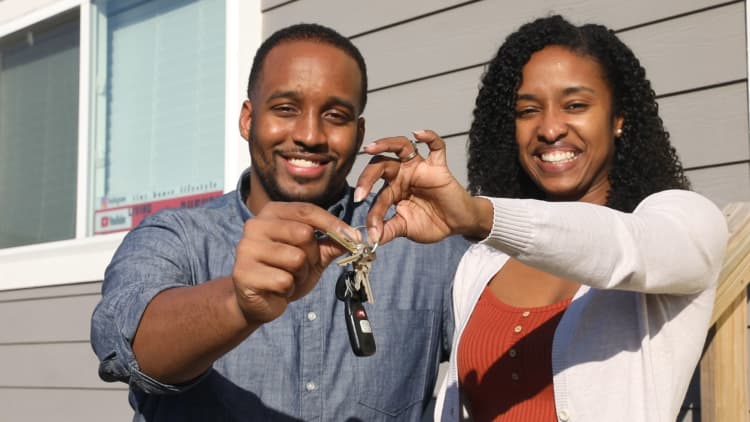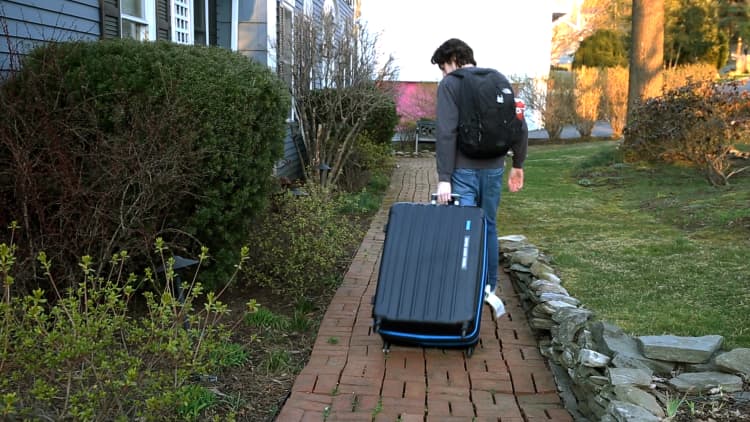Should we all be wearing masks? It's the question on everyone's mind amid the COVID-19 pandemic, which has infected at least 337,900 people in the United States as of Monday, according to data compiled by Johns Hopkins University.
The answer is not straightforward.
In a press briefing on Friday, President Donald Trump said that the Centers for Disease Control now recommends wearing cloth face coverings. But he added that he doesn't think he will use one.
"I just don't want to wear one myself, it's a recommendation," President Trump said. "Somehow sitting in the Oval Office behind that beautiful Resolute Desk, the great Resolute Desk, I think wearing a face mask as I greet presidents, dictators, kings, queens, I don't know, I don't see it for myself."
The new guidelines say people should wear cloth face coverings, not surgical masks or N95 respirators, "in public settings where other social distancing measures are difficult to maintain," according to the CDC's website.
Still, the World Health Organization says that surgical masks should only be worn by healthcare workers, infected people or those who are taking care of someone who is infected.
The reason for the change in the recommendation at the CDC and among experts has to do with new research that points to how the disease is spread.
Here's what you need to know about masks, according to experts.
What masks can and can't do for the public
COVID-19 is believed to spread through respiratory droplets when an infected person coughs or sneezes, or from coming into contact with an infected surface and then touching your eyes, nose or mouth.
There's some evidence that COVID-19 may also be transmitted through much smaller airborne droplets in "very specific circumstances and settings," such as "aerosolizing" medical procedures that cause the person cough or spit, such as suctioning or intubation, according to the WHO.
And in a letter to the White House, Harvey Fineberg, chairman of the National Academy of Sciences Standing Committee on Emerging Infectious Diseases and 21st Century Health Threats, also said that aerosolized droplets can be produced by simply talking or breathing, CNN reported Thursday. "Currently available research supports the possibility that [coronavirus] could be spread via bioaerosols generated directly by patients' exhalation," he wrote.
When it comes to masks, this distinction between droplets and aerosolization is important, because surgical masks and homemade masks cannot prevent airborne transmission, while N95 respirators can.
Surgical masks
Surgical masks are loose-fitting disposable masks that loop around the ears and cover the nose and mouth. Because they aren't fitted on the sides, they don't provide protection from airborne germs, according to the Food and Drug Administration.
But surgical masks do stop larger droplets, splashes, saliva and respiratory secretions from spreading.
In other words, wearing a surgical mask can't necessarily prevent a given individual from contracting coronavirus, but it could help stop people from spreading it. That is important because people who are infected can spread the virus days before symptoms show up, and some never get symptoms.
The problem is, America is experiencing a shortage of surgical masks, so public health organizations are stressing that medical-grade masks should be saved for healthcare providers, sick people or those caring for someone who is sick.
N95 respirators
N95 respirators are a different story — they are more protective because when used properly they are tight-fitting and filter out airborne particles. But according to the CDC, "these respirators are not used or needed outside of healthcare settings."
And of course, there is a shortage of N95 masks too.
"N95 masks are critical for the healthcare providers in the trenches," Peter Gulick, associate professor of medicine, College of Osteopathic Medicine, Michigan State University tells CNBC Make It. "They can't use surgical masks or any kind of makeshift masks." However amid the N95 shortage, the CDC has permitted healthcare workers to use surgical masks, and save the N95s for specific situations, such as aerosolizing procedures, including intubation or suctioning.
"We're really trying to preserve [N95 masks for healthcare workers] at all costs," Gulick says.
Homemade masks
If healthcare workers need all the surgical and N95 masks, that leaves cloth face coverings made from fabric or scarves.
The U.S. Surgeon General Jerome Adams said in a video for the CDC that you can use a folded t-shirt, towel, scarf or bandana to make a cloth face covering.
Whereas surgical masks have to be made to a certain standard, there are no official guidelines to ensure quality control when you're making your own masks, Gulick says. Depending upon the type of fabric used, and the fit of the mask, there could be wide variations in what a homemade mask can and can't do.
At best, "if you're wearing a scarf around your face, or another homemade mask, then there's a chance that your secretions will be contained in that as opposed to being spread to the environment," Angela Hewlett of the Infectious Diseases Society of America told CNBC Wednesday.
Putting on a homemade mask if you're healthy could also dissuade you from touching your face, David Price, director of pulmonary critical care at Weill-Cornell Medical Center in New York City said in a recorded information session about COVID-19. (Other strategies to stop touching your face include distracting yourself with fidget toys and shifting your thinking from, "don't touch your face" to "I'm going to be more aware of touching my face today.")
Using homemade masks also frees up more reliable medical masks for healthcare providers, Price said.

The problem with masks
Experts have several concerns when it comes to the public wearing masks.
First, wearing a mask can give a false sense of safety (remember surgical and homemade masks can't necessarily prevent you from getting COVID-19 from someone else). And that can make people sloppier with other important prevention tactics, such as washing your hands or staying six feet from others.
Another concern is that wearing a mask could make you touch your face more, Gulick says. You may be more inclined to adjust the mask, for example, and accidentally contaminate your face, so it's "somewhat risky," he says. You have to be very vigilant about where your hands are.
On that note, according to the WHO, face masks are only effective when they're used in conjunction with proper hand-washing measures. The WHO also has strict rules about how to properly and safely put on and take off a mask to avoid contamination.
The bottom line
Surgical masks should be used by healthcare workers, people who have COVID-19, people who are coughing and sneezing and those who are taking care of a sick individual.
Beyond that, masks may be a tool to help us "flatten the curve," but they can't replace good hygiene and social distancing measures.
"Better to keep the six-foot distance, better to keep in homes, better to keep washing your hands," Gulick says.
This story has been updated with the CDC's latest recommendation on face masks.
Check out: The best credit cards of 2020 could earn you over $1,000 in 5 years
Don't miss:



